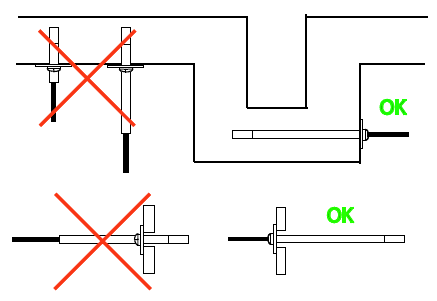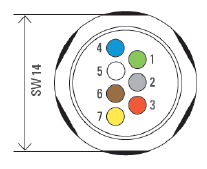Functions |
Description |
Diameter barrel |
•15 mm (0.6") (HC2A-ICXXX, HC2A-IMXXX-M) •15 / 25 mm (0.6" / 1.0") (HC2A-ICXXX-A) |
Thread |
•G 1/2" (HC2A-IE102-G) •NPT 1/2" (HC2A-IE02-NPT) |
Recommended torque |
70 Nm (HC2A-IE02-G, HC2A-IE02-NPT) |
Pressure resistant |
100 bar / 1450 PSI (HC2A-IE02-G, HC2A-IE02-NPT) |
Length (probe head) |
•144 mm (5.7") (HC2A-ICXXX) •294 mm (11.6") (HC2A-IC302) •400 mm (15.7") (HC2A-IC402-A) •700 mm (27.5") (HC2A-IC702-A) •130 mm (5.1") (HC2A-IM102-M) •280 mm (11.0") (HC2A-IM30X-M) •148 mm (5.8") (HC2A-IEXX) |
Cable length |
•2 m (6.5 ft) •2 m or 5 m (16.4 ft) (HC2A-IC10X) (HC2A-IM30X-M) |
Housing material |
•PPS (HC2A-ICXXX, HC2A-ICXXX-A) •Stainless steel, DIN 1.4301 |
Connector
All HC2A probes use the same connector (male).
Connection diagram (7-pin connector, male – view: probe side)
|
1) V+ 2) GND (digital and supply) 3) UART RxD 4) UART TxD 5) Analog signal humidity (0...100°RH = 0...1V) 6) Analog signal temperature (-40...60°C = 0...1V) 7) AGND (analog ground) |
Installation
For best measurement results, please consider the following points:
oInstall the probe at a representative location for the process to be measured.
oAvoid the following:
▪Probe near a heating or cooling element, a cold/hot wall, in direct sunlight, etc.
▪Probe near a steam inlet, humidifier, or atmospheric precipitation
▪Pressure fluctuations (e.g. in compressed air systems)
oThe probe should not be installed above a heating element.
oThe airflow might be faster than 1 m/s if possible
If installed through a wall, make sure the probe is inserted as far as possible into the environment being measured.

During installation, make sure that no condensation can collect on or in the probe and cause a short circuit at the sensor connections. Probes should be installed with the sensors at the bottom. This allows waste heat from the electronics to escape upward. If not possible, then horizontal installation is also acceptable.
